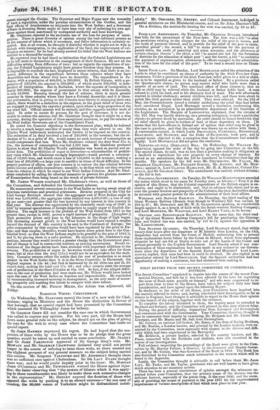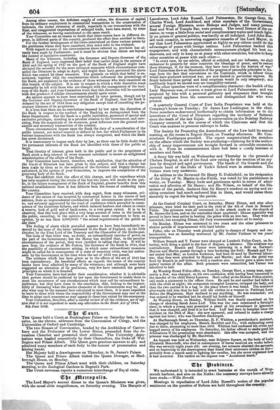FIRST REPORT FROM THE SECRET COMMITTEE ON COMMERCIAL DISTRESS.
The Secret Committee " appointed to inquire into the causes of the recent Cora- mercial Distress, and how far it has been affected by the laws for regulating the issue of Bank-notes payable on demand," and who were empowered to re- port from time to time to the House, have taken the subject fatly into their consideration, and have agreed upon the following Report. In obedience to the order of the House, your Committee have inquired into the matters referred to them; and, having concluded their investigation so far as relates to England, have thought it advisable to report to the House their opinion on this branch of the subject, together with the evidence.
To complete the labour intrusted to them, the inquiry must be extended to Scotland and Ireland; and the Committee will proceed on this duty without delay.
During the period of difficulty, deputations from Liverpool and Birmingham had communicated with the Government. Your Committee, therefore, thought it best to commence their inquiry by examining Mr. Hodgson and Mr. Turner from Liverpool, and Mr. Muntz and Mr. Salt from Birmingham. Mr. Gurney, an eminent bill-broker, Mr. Bates, of the firm of Baring Brothers, and Mr. Heaven, a London banker, all selected by the London bankers, were ex- amined by the Committee, more especially with respect to the distress and diffi- culty which had been experienced in the Metropolis. Mr. Birkbeck, a private 'banker, selected by the country bankers, and Mr. Pease, connected with the Northern coal districts, were also examined in the course of our investigations. Full evidence respecting the proceedings of the Bank were given to the Com- mittee by Mr. Horsley Palmer, a Director, by the Governor and .Deputy-Gover- nor, and by Mr. Cotton, who was Governor of the Bank in 1844. 'The Bank has also furnished to the Committee much information in the returns which will be found in the Appendix. Lastly, the Committee thought it advisable to call before them Mr. Jones Loyd, Mr. Tooke' and Mr. Taylor, gentlemen who are well known to have given much attention to our monetary system. There has been a general concurrence of opinion amongst the witnesses ex- amined before your Committee, that the primary cause of the distress was the deficient harvest, especially of the potato crop, in the year 1846, and the noses- of providing the meow of payment in the year 1847 for the unprecedented importations of vaiious descriptions of food which took place in that year.
. Among other causes, the deficient supply of cotton, the diversion of capital from its ordinary employment in commercial transactions to the construction of 'railroads the undue extension of credit, especially in our transactions with the Best, and exaggerated expectations of enlarged bade, have been stated, by some of the witnesses, as having contributed to the same result.
Your Committee see no reason to doubt that these causes have in different de- grees, in different parts of the country, produced the effect thus ascribed to them. For the further development of the views entertained on these various points by the gentlemen whom they have examined, they must refer to the evidence.
With regard to some of the circumstances above referred to, provision has al- ready been made by Parliament; and it must be obvious that others are beyond the control of legislative enactment.
Many of the witnee.as, including the Governor and Deputy-Governor of the Bank of England, have expressed their belief that earlier steps in the autumn of 1846 and the spring of 1847 on the part of the Bank of England might have obviated the necessity for the more stringent measures which circumstances com- pelled the Directors to adopt in April, and might thus have prevented the alarm which was caused by those measures. The grounds on which that belief is en- tertained, together with the considerations which influenced the proceedings of
the Bank, are explained in the evidence of those witnesses who were examined on this branch of the subject. It is one in respect to which a wide discretion must necessarily be left with those who are charged with the management of the busi- ness of the Bank; and your Committee trust that this discretion will be exercised with due prudence if similar circumstances should again occur. An opinion appears to have been entertained by some persons, though not by the Governor and Deputy-Governor of the Bank. of England, that the Bank is released by the act of 1844 from any obligation except that of consulting the pe- cuniary interests of its proprietors. It is true that there are no restrictions imposed by law upon the discretion of the Bank in respect to the conduct of the Banking as distinguished from the Issue Department. But the Bank is a public institution, possessed of special and exclusive privileges, standing in a peculiar relation to the Government, and exer- cising, from the magnitude of its resources, great influence over the general mer- cantile and monetary transactions of the country. These circumstances impose upon the Bank the duty of a consideration of the public interest, not indeed enacted or defined by law, but which Parliament in its various transactions with the Bank has always recognized, and which the Bank has never disclaimed.
It is unnecessary to impose such duty by law, as there can be little doubt that the permanent interests of the Bank are identified with those of the public at large.
That identity of interest gives both to the public and to the proprietors of Bank stock a deep interest in every measure calculated to insure an enlightened administration of the affairs of the Bank.
Your Committee have learnt, therefore, with satisfaction, that the attention of the Court of Directors has been given to this subject, and that a change has
been trade by them as to the selection of the Governor and Deputy-Governor, calculated, in the opinion of your Committee, to improve the constitution of the governing body of the Bank. They feel confident that the effect of this change, and the experience which has been acquired during the events of the last two years, will insure to the pub- lic, in the future management of the Bank of England, greater benefits from this national establishment than it has hitherto been the means of conferring upon the country. Your Committee have received, with deep regret, from many witnesses, evi- dence of the extent of loss incurred by commercial houses in the course of last autumn, from an unprecedented combination of the circumstances above referred to, and seriously aggravated by the want of confidence which prevailed in conse- quence of the numerous failures, and which induced bankers and others to retain
a reserve, both of gold and of bank-notes, to a very great extent. It is to be observed, that this took place with a very large amount of notes in the hands of the public' exceeding, in the opinion of a witness most competent to form an opinion by no less than 4,000,000/. " the actual requirements of the public at the time."
The feeling of alarm which prevailed appears to have been immediately re- moved by the issue of the letter addressed to the Bank of England, on the 25th October, by the First Lord of the Treasury and the Chancellor of the Exchequer. The issue of that letter was, no doubt, an extraordinary exercise of power on the part of the Government; but the House has decided that, in the peculiar circumstances of the period, they were justified in taking that step. It will be seen from the evidence of Mr. Cotton, the Governor of the Bank in 1844, that the possibility of circumstances arising, in which some extraordinary measures might be called for in consequence of a state of monetary crisis, was not unfore- seen by the Government at the time when the act of 1814 was passed. The evidence which has been given as to the effects of the act of 1844 has been contradictory. Its beneficial effects as regards the issues of the country banks have been admitted by many of the witnesses; and although some have suggested an alteration of its provisions, very few have contested the general principles on which it is founded.
Your Committee have had under their consideration, whether it is advisable that powers should be conferred by law upon the Government to enable them to meet the occurrence of any circumstances which may call for extraordinary in- terference; but they have come to the conclusion, that, looking to the impossi- bility of foreseeing what the precise character of the circumstances may be, and also what may be the measure best calculated to meet them, it is more expedient to leave to those with whom the responsibility of the Government may rest at the time to adopt such measures as may appear to them best suited for the emergency. Your Committee, therefore, after a careful review of all the evidence, are of opi- nion that it is not expedient to make any alteration in the Bank Act of 1844.
8th Jane 1848.



























 Previous page
Previous page